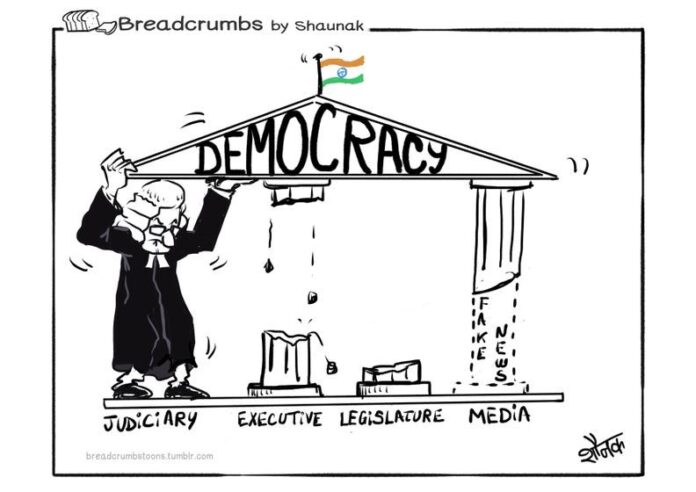15 September is observed as the International Day of Democracy based on a 2007 resolution of the United Nations General Assembly. The resolution was passed in accordance with the Universal Declaration on Democracy adopted by the Inter-Parliamentary Union in September 1997, which affirms the principles of democracy, the elements and exercise of democratic government, and the intentional scope of democracy.
The observance of the International Day of Democracy is meant to be an opportunity for parliaments emphasize the importance of democracy and its processes, and to self-assess a parliament’s performance of democratic functions and identify steps to strengthen its effectiveness.
The theme for this year’s International Day of Democracy is “COVID-19: A Spotlight on Democracy”. The pandemic has presented many challenges to governments across the world and some of the concerns regarding the state of democracy during the pandemic, include:
Measures to control the flow of information and crackdown on freedom of expression and press freedom against an existing background of shrinking civic space.
Arrest, detention, prosecution or persecution of political opponents, journalists, doctors and healthcare workers, activists and others for allegedly spreading “fake news”.
Aggressive cyber-policing and increased online surveillance.
Postponement of elections is raising serious constitutional issues in some cases and may lead to rising tensions
The various ways in which the Covid-19 crisis may impair democracy and increase authoritarianism, need to be addressed and counteracted in various ways. These include:
developing media literacy and digital safety, more critical than ever as activism is forced online, so as to address the risk of suppression, interference and closing of civic space;
fighting misinformation, disinformation and hate speech, which have mushroomed in the crisis;
training journalists remotely to report on the impact of the pandemic with in-depth, fact-checked coverage, while staying safe on the front line;
empowering women against gender-based violence, which has surged amid Covid-19 lockdowns, quarantines, and social and economic pressures;
helping to highlight the challenges of inequality and weak service delivery made worse by the crisis, with specific focus on the needs and rights of women, youth, minorities and other marginalized populations, so as to help hold governments to account.
While governments genuinely interested in preserving democracy might take this day as an opportunity to strengthen their democratic structures, truth is that the largest democracies in the world are being ruled by political players who would be most benefited by a complete erosion of democracy, be it Modi representing the interests of Brahminical capitalism in India or Trump representing White supremacist capitalism in the USA.
Experts have pointed out how the independence of the four pillars of democracy, namely the legislature, the executive, the judiciary, and the media, have all been continuously undermined by an all-powerful executive.

This month, the Lok Sabha decided that the monsoon session of Parliament would be held without a Question Hour. The Question Hour is a segment of a parliament session during which MPs are allowed to ask questions of the government, and is a crucial process for ensuring the accountability of the executive to the legislature.
The members of the legislature, who are meant to be representatives of people’s interests, have no framework of accountability to ensure that they indeed represent people’s interests. Instead, members of the legislature operate on the interests of the party. At present, the BJP commands 56.01 percent of the seats of the Lok Sabha, with the second-highest number of seats commanded by any party being a mere 9.43 percent.
The executive and the legislature are effectively controlled by the same one party, which is continuously attempting to bypass any checks and balances that may reduce its control, including the scrapping of Question Hour, and before this strategies such as passing bills as ‘money bills’ ensuring that the Rajya Sabha, in which it did not have a majority at the time, would not be able to pass it, or avoiding assigning bills to be examined by standing committees.
Maneesh Chhiber points out the erosion of independent executive bodies,
“In my view, the police have gone rogue on several occasions, the Income Tax department is seen as one of the most corrupt departments, the so-called independent investigating agencies like the CBI and ED are happy being hand-maidens of whichever party is in power. The lure of post-retirement jobs often drives the in-the-job decisions of our bureaucrats.
Independent institutions like the Election Commission, the Comptroller and Auditor General of India (CAG) and Central Information Commission seem to have become extensions of the government, or should one say the party in power.”
In March this year, in an unprecedented move, the former Chief Justice of India, Ranjan Gogoi was nominated to be a member of the Rajya Sabha by the President, bringing to question the severe erosion of the independence of the judiciary as well. Allegations of corruption in the Judiciary and collusion between judges and the BJP-RSS have been met with undue defensiveness and suppression from the judiciary.
The fourth pillar of democracy, a free and independent media, meant to provide a check to the functioning of the government and the judiciary is as hollow as it has ever been. BJP-RSS linked persons have had enormous control over the spread of information and hate speech, be it on Facebook or Republic TV.
While members of the BJP may not directly be part of all pillar and all independent bodies, that there are no checks on members of independent bodies having links to the RSS, ensures the nexus of the executive with the very bodies meant to put a check on it. Further, democratic structures are immensely undermined by the fact that all the pillars are unabashedly tied to and promote the business interests of the richest few people of the country.



